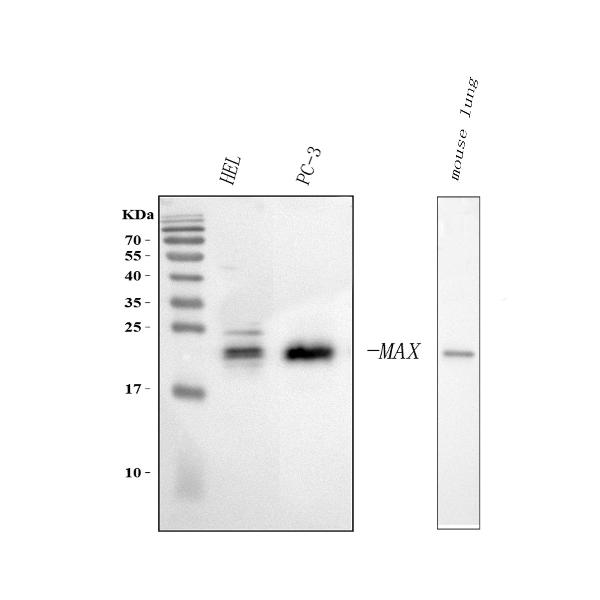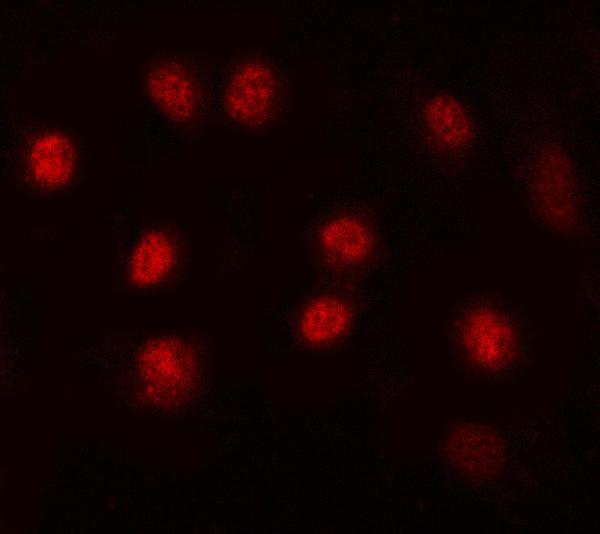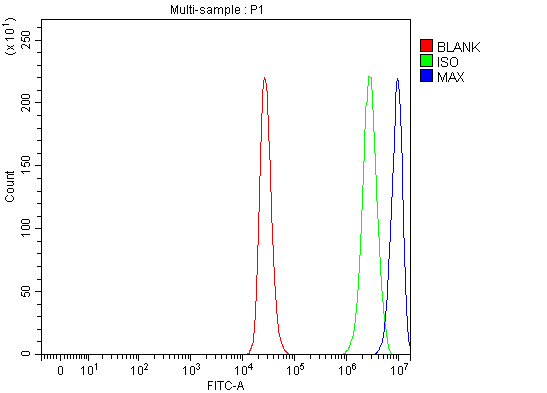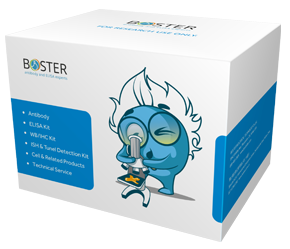Product Info Summary
| SKU: | A03239 |
|---|---|
| Size: | 100 μg/vial |
| Reactive Species: | Human, Mouse |
| Host: | Rabbit |
| Application: | ELISA, Flow Cytometry, IF, ICC, WB |
Customers Who Bought This Also Bought
Product info
Product Name
Anti-MAX Antibody Picoband™
SKU/Catalog Number
A03239
Size
100 μg/vial
Form
Lyophilized
Description
Boster Bio Anti-MAX Antibody Picoband™ catalog # A03239. Tested in ELISA, Flow Cytometry, IF, ICC, WB applications. This antibody reacts with Human, Mouse.
Storage & Handling
Store at -20˚C for one year from date of receipt. After reconstitution, at 4˚C for one month. It can also be aliquotted and stored frozen at -20˚C for six months. Avoid repeated freeze-thaw cycles.
Cite This Product
Anti-MAX Antibody Picoband™ (Boster Biological Technology, Pleasanton CA, USA, Catalog # A03239)
Host
Rabbit
Contents
Each vial contains 4 mg Trehalose, 0.9 mg NaCl and 0.2 mg Na2HPO4.
Clonality
Polyclonal
Isotype
Rabbit IgG
Immunogen
E. coli-derived human MAX recombinant protein (Position: A30-R106).
*Blocking peptide can be purchased. Costs vary based on immunogen length. Contact us for pricing.
Cross-reactivity
No cross-reactivity with other proteins.
Reactive Species
A03239 is reactive to MAX in Human, Mouse
Applications
A03239 is guaranteed for ELISA, Flow Cytometry, IF, ICC, WB Boster Guarantee
Observed Molecular Weight
19-21 kDa
Calculated molecular weight
18.275kDa
Background of MAX
MAX (Max protein), also called Myc-associated factor x, is the most conserved dimerization component of the MYC-MAX-MXD1 network of basic helix-loop-helix leucine zipper (bHLHZ) transcription factors that regulate cell proliferation, differentiation, and apoptosis. The conservation of the MAX sequence is particularly high in the bHLHZ domain, which is involved in protein-protein interactions and DNA binding. The MAX gene is located on chromosome 14q23 by fluorescence in situ chromosomal hybridization. Both quasisymmetric heterodimers resemble the symmetric MAX homodimer, albeit with marked structural differences in the coiled-coil leucine zipper regions that explain preferential homo- and heteromeric dimerization of these 3 evolutionarily related DNA-binding proteins. MAX acts as a classic tumor suppressor gene. Normal lymphocytes from patients showed absence of methylation of the MAX promoter and biallelic expression of MAX, which ruled out an imprinting-mediated effect on MAX expression. The ability of these cells to divide, differentiate, and apoptose in the absence of Max demonstrated for the first time that these processes can occur via Max- and possibly Myc-independent mechanisms.
Antibody Validation
Boster validates all antibodies on WB, IHC, ICC, Immunofluorescence, and ELISA with known positive control and negative samples to ensure specificity and high affinity, including thorough antibody incubations.
Innovating Scientists Reward
If you are the first to review this product, or if you have results for a special sample, species or application this product is not validated in, share your results with us and receive product credits you can use towards any Boster products! Applicable to all scientists worldwide.
Submit A Review
Assay dilution & Images
Reconsitution
Add 0.2ml of distilled water will yield a concentration of 500ug/ml.
Assay Dilutions Recommendation
The recommendations below provide a starting point for assay optimization. The actual working concentration varies and should be decided by the user.
Western blot, 0.1-0.5μg/ml
Immunocytochemistry/Immunofluorescence, 5 μg/ml
Flow Cytometry(Fixed), 1-3 μg/1x106 cells
Direct ELISA, 0.1-0.5μg/ml
Validation Images & Assay Conditions

Click image to see more details
Figure 1. Western blot analysis of MAX using anti-MAX antibody (A03239).
Electrophoresis was performed on a 5-20% SDS-PAGE gel at 70V (Stacking gel) / 90V (Resolving gel) for 2-3 hours. The sample well of each lane was loaded with 30 ug of sample under reducing conditions.
Lane 1: human HEL whole cell lysates,
Lane 2: human PC-3 whole cell lysates,
Lane 3: mouse lung tissue lysates.
After electrophoresis, proteins were transferred to a nitrocellulose membrane at 150 mA for 50-90 minutes. Blocked the membrane with 5% non-fat milk/TBS for 1.5 hour at RT. The membrane was incubated with rabbit anti-MAX antigen affinity purified polyclonal antibody (Catalog # A03239) at 0.5 μg/mL overnight at 4°C, then washed with TBS-0.1%Tween 3 times with 5 minutes each and probed with a goat anti-rabbit IgG-HRP secondary antibody at a dilution of 1:5000 for 1.5 hour at RT. The signal is developed using an Enhanced Chemiluminescent detection (ECL) kit (Catalog # EK1002) with Tanon 5200 system. A specific band was detected for MAX at approximately 19-21 kDa. The expected band size for MAX is at 18 kDa.

Click image to see more details
Figure 2. IF analysis of MAX using anti-MAX antibody (A03239).
MAX was detected in an immunocytochemical section of A549 cells. Enzyme antigen retrieval was performed using IHC enzyme antigen retrieval reagent (AR0022) for 15 mins. The cells were blocked with 10% goat serum. And then incubated with 5 μg/mL rabbit anti-MAX Antibody (A03239) overnight at 4°C. Cy3 Conjugated Goat Anti-Rabbit IgG (BA1032) was used as secondary antibody at 1:500 dilution and incubated for 30 minutes at 37°C. Visualize using a fluorescence microscope and filter sets appropriate for the label used.

Click image to see more details
Figure 3. Flow Cytometry analysis of THP-1 cells using anti-MAX antibody (A03239).
Overlay histogram showing THP-1 cells stained with A03239 (Blue line). To facilitate intracellular staining, cells were fixed with 4% paraformaldehyde and permeabilized with permeabilization buffer. The cells were blocked with 10% normal goat serum. And then incubated with rabbit anti-MAX Antibody (A03239, 1 μg/1x106 cells) for 30 min at 20°C. DyLight®488 conjugated goat anti-rabbit IgG (BA1127, 5-10 μg/1x106 cells) was used as secondary antibody for 30 minutes at 20°C. Isotype control antibody (Green line) was rabbit IgG (1 μg/1x106) used under the same conditions. Unlabelled sample (Red line) was also used as a control.
Protein Target Info & Infographic
Gene/Protein Information For MAX (Source: Uniprot.org, NCBI)
Gene Name
MAX
Full Name
Protein max
Weight
18.275kDa
Superfamily
MAX family
Alternative Names
BHLHD4; bHLHd4MGC11225; bHLHd5; bHLHd6; bHLHd7; bHLHd8; Class D basic helix-loop-helix protein 4; helix-loop-helix zipper protein; MAX protein; Max; MGC10775; MGC18164; MGC34679; MGC36767; MYC associated factor X; Myc-associated factor X; orf1; protein max MAX bHLHd4 MYC associated factor X protein max|class D basic helix-loop-helix protein 4
*If product is indicated to react with multiple species, protein info is based on the gene entry specified above in "Species".For more info on MAX, check out the MAX Infographic

We have 30,000+ of these available, one for each gene! Check them out.
In this infographic, you will see the following information for MAX: database IDs, superfamily, protein function, synonyms, molecular weight, chromosomal locations, tissues of expression, subcellular locations, post-translational modifications, and related diseases, research areas & pathways. If you want to see more information included, or would like to contribute to it and be acknowledged, please contact [email protected].
Specific Publications For Anti-MAX Antibody Picoband™ (A03239)
Hello CJ!
A03239 has been cited in 1 publications:
*The publications in this section are manually curated by our staff scientists. They may differ from Bioz's machine gathered results. Both are accurate. If you find a publication citing this product but is missing from this list, please let us know we will issue you a thank-you coupon.
Alterations of serum cytokine levels and their relation with inflammatory markers in candidemia
Recommended Resources
Here are featured tools and databases that you might find useful.
- Boster's Pathways Library
- Protein Databases
- Bioscience Research Protocol Resources
- Data Processing & Analysis Software
- Photo Editing Software
- Scientific Literature Resources
- Research Paper Management Tools
- Molecular Biology Software
- Primer Design Tools
- Bioinformatics Tools
- Phylogenetic Tree Analysis
Customer Reviews
Have you used Anti-MAX Antibody Picoband™?
Submit a review and receive an Amazon gift card.
- $30 for a review with an image
Be the first to review Anti-MAX Antibody Picoband™
*The first user to submit a review for a product is eligible for Boster's Innovating Scientists Reward, which gives product credits. This is in addition to the gift card reward.
Customer Q&As
Have a question?
Find answers in Q&As, reviews.
Can't find your answer?
Submit your question
17 Customer Q&As for Anti-MAX Antibody Picoband™
Question
I would like using your anti-MAX antibody for transcription of e2f targets under negative control by dream complex studies. Has this antibody been tested with western blotting on intestinal cancer tissue? We would like to see some validation images before ordering.
Verified Customer
Verified customer
Asked: 2020-04-07
Answer
Thank you for your inquiry. This A03239 anti-MAX antibody is tested on rat kidney tissue, tissue lysate, intestinal cancer tissue, cardiac muscle tissue. It is guaranteed to work for ELISA, IHC, WB in human, mouse, rat. Our Boster guarantee will cover your intended experiment even if the sample type has not been be directly tested.
Boster Scientific Support
Answered: 2020-04-07
Question
Here is the WB image, lot number and protocol we used for cervix carcinoma using anti-MAX antibody A03239. Please let me know if you require anything else.
Verified Customer
Verified customer
Asked: 2020-03-12
Answer
Thank you very much for the data. Our lab team are working to resolve this as quickly as possible, and we appreciate your patience and understanding! You have provided everything we needed. Please let me know if there is anything you need in the meantime.
Boster Scientific Support
Answered: 2020-03-12
Question
I was wanting to use your anti-MAX antibody for IHC for mouse cervix carcinoma on frozen tissues, but I want to know if it has been validated for this particular application. Has this antibody been validated and is this antibody a good choice for mouse cervix carcinoma identification?
Verified Customer
Verified customer
Asked: 2020-02-14
Answer
As indicated on the product datasheet, A03239 anti-MAX antibody has been tested for ELISA, IHC, WB on human, mouse, rat tissues. We have an innovator award program that if you test this antibody and show it works in mouse cervix carcinoma in IHC-frozen, you can get your next antibody for free.
Boster Scientific Support
Answered: 2020-02-14
Question
We bought anti-MAX antibody for ELISA on brain in a previous experiment. I am using mouse, and We want to use the antibody for WB next. I am interested in examining brain as well as lung uterus in our next experiment. Do you have any suggestion on which antibody would work the best for WB?
Verified Customer
Verified customer
Asked: 2020-02-03
Answer
I looked at the website and datasheets of our anti-MAX antibody and it appears that A03239 has been tested on mouse in both ELISA and WB. Thus A03239 should work for your application. Our Boster satisfaction guarantee will cover this product for WB in mouse even if the specific tissue type has not been validated. We do have a comprehensive range of products for WB detection and you can check out our website bosterbio.com to find out more information about them.
Boster Scientific Support
Answered: 2020-02-03
Question
Would A03239 anti-MAX antibody work on parafin embedded sections? If so, which fixation method do you recommend we use (PFA, paraformaldehyde, other)?
Verified Customer
Verified customer
Asked: 2019-12-04
Answer
It shows on the product datasheet, A03239 anti-MAX antibody as been tested on IHC. It is best to use PFA for fixation because it has better tissue penetration ability. PFA needs to be prepared fresh before use. Long term stored PFA turns into formalin, as the PFA molecules congregate and become formalin.
Boster Scientific Support
Answered: 2019-12-04
Question
My lab would like to test anti-MAX antibody A03239 on mouse cervix carcinoma for research purposes, then I may be interested in using anti-MAX antibody A03239 for diagnostic purposes as well. Is the antibody suitable for diagnostic purposes?
Verified Customer
Verified customer
Asked: 2019-11-14
Answer
The products we sell, including anti-MAX antibody A03239, are only intended for research use. They would not be suitable for use in diagnostic work. If you have the means to develop a product into diagnostic use, and are interested in collaborating with us and develop our product into an IVD product, please contact us for more discussions.
Boster Scientific Support
Answered: 2019-11-14
Question
Is this A03239 anti-MAX antibody reactive to the isotypes of MAX?
Verified Customer
Verified customer
Asked: 2019-10-11
Answer
The immunogen of A03239 anti-MAX antibody is E. coli-derived human MAX recombinant protein (Position: A30-R106). Could you tell me which isotype you are interested in so I can help see if the immunogen is part of this isotype?
Boster Scientific Support
Answered: 2019-10-11
Question
We have observed staining in human brain. What should we do? Is anti-MAX antibody supposed to stain brain positively?
Verified Customer
Verified customer
Asked: 2019-10-03
Answer
According to literature brain does express MAX. According to Uniprot.org, MAX is expressed in blood, mammary gland, thalamus thymus, brain, lung uterus, cervix carcinoma, erythroleukemia, among other tissues. Regarding which tissues have MAX expression, here are a few articles citing expression in various tissues:
Brain, Lung, and Uterus, Pubmed ID: 15489334
Cervix carcinoma, Pubmed ID: 17081983, 18691976, 20068231
Erythroleukemia, Pubmed ID: 23186163
Mammary gland, Thalamus, and Thymus, Pubmed ID: 14702039
Boster Scientific Support
Answered: 2019-10-03
Question
Will anti-MAX antibody A03239 work for IHC with cervix carcinoma?
Verified Customer
Verified customer
Asked: 2019-06-24
Answer
According to the expression profile of cervix carcinoma, MAX is highly expressed in cervix carcinoma. So, it is likely that anti-MAX antibody A03239 will work for IHC with cervix carcinoma.
Boster Scientific Support
Answered: 2019-06-24
Question
Is a blocking peptide available for product anti-MAX antibody (A03239)?
Verified Customer
Verified customer
Asked: 2019-04-01
Answer
We do provide the blocking peptide for product anti-MAX antibody (A03239). If you would like to place an order for it please contact [email protected] and make a special request.
Boster Scientific Support
Answered: 2019-04-01
Question
My question regarding product A03239, anti-MAX antibody. I was wondering if it would be possible to conjugate this antibody with biotin. I would need it to be without BSA or sodium azide. I am planning on using a buffer exchange of sodium azide with PBS only. Would there be problems for me to conjugate the antibody and store it in -20 degrees in small aliquots?
J. Wu
Verified customer
Asked: 2019-02-13
Answer
We suggest not storing this antibody with PBS buffer only in -20 degrees. If you want to store it in -20 degrees it is best to add some cryoprotectant like glycerol. If you want carrier free A03239 anti-MAX antibody, we can provide it to you in a special formula with trehalose and/or glycerol. These molecules will not interfere with conjugation chemistry and provide a good level of protection for the antibody from degradation. Please be sure to specify this in your purchase order.
Boster Scientific Support
Answered: 2019-02-13
Question
Do you have a BSA free version of anti-MAX antibody A03239 available?
Verified Customer
Verified customer
Asked: 2018-11-14
Answer
We appreciate your recent telephone inquiry. I can confirm that some lots of this anti-MAX antibody A03239 are BSA free. For now, these lots are available and we can make a BSA free formula for you free of charge. It will take 3 extra days to prepare. If you require this antibody BSA free again in future, please do not hesitate to contact me and I will be pleased to check which lots we have in stock that are BSA free.
Boster Scientific Support
Answered: 2018-11-14
Question
We were well pleased with the WB result of your anti-MAX antibody. However we have seen positive staining in cervix carcinoma nucleus. cell projection using this antibody. Is that expected? Could you tell me where is MAX supposed to be expressed?
Verified Customer
Verified customer
Asked: 2017-07-13
Answer
Based on literature, cervix carcinoma does express MAX. Generally MAX expresses in nucleus. cell projection, neuron projection,. Regarding which tissues have MAX expression, here are a few articles citing expression in various tissues:
Brain, Lung, and Uterus, Pubmed ID: 15489334
Cervix carcinoma, Pubmed ID: 17081983, 18691976, 20068231
Erythroleukemia, Pubmed ID: 23186163
Mammary gland, Thalamus, and Thymus, Pubmed ID: 14702039
Boster Scientific Support
Answered: 2017-07-13
Question
Does anti-MAX antibody A03239 work on dog ELISA with thalamus thymus?
N. Miller
Verified customer
Asked: 2017-05-04
Answer
Our lab technicians have not tested anti-MAX antibody A03239 on dog. You can run a BLAST between dog and the immunogen sequence of anti-MAX antibody A03239 to see if they may cross-react. If the sequence homology is close, then you can perform a pilot test. Keep in mind that since we have not validated dog samples, this use of the antibody is not covered by our guarantee. However we have an innovator award program that if you test this antibody and show it works in dog thalamus thymus in ELISA, you can get your next antibody for free.
Boster Scientific Support
Answered: 2017-05-04
Question
I see that the anti-MAX antibody A03239 works with IHC, what is the protocol used to produce the result images on the product page?
M. Krishna
Verified customer
Asked: 2016-12-21
Answer
You can find protocols for IHC on the "support/technical resources" section of our navigation menu. If you have any further questions, please send an email to [email protected]
Boster Scientific Support
Answered: 2016-12-21
Question
I appreciate helping with my inquiry over the phone. Here are the WB image, lot number and protocol we used for cervix carcinoma using anti-MAX antibody A03239. Let me know if you need anything else.
A. Johnson
Verified customer
Asked: 2016-11-10
Answer
Thanks for the data. You have provided everything we needed. Our lab team are working to resolve your inquiry as quickly as possible, and we appreciate your patience and understanding! Please let me know if there is anything you need in the meantime.
Boster Scientific Support
Answered: 2016-11-10
Question
We are currently using anti-MAX antibody A03239 for mouse tissue, and we are content with the WB results. The species of reactivity given in the datasheet says human, mouse, rat. Is it possible that the antibody can work on feline tissues as well?
E. Krishna
Verified customer
Asked: 2015-07-14
Answer
The anti-MAX antibody (A03239) has not been validated for cross reactivity specifically with feline tissues, but there is a good chance of cross reactivity. We have an innovator award program that if you test this antibody and show it works in feline you can get your next antibody for free. Please contact me if I can help you with anything.
Boster Scientific Support
Answered: 2015-07-14





